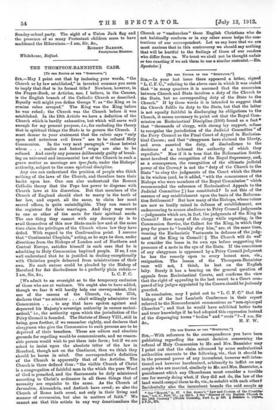THE THOMPSON-BANNISTER CASE.
[To THE EDITOR OF THE S r Kari To fc."] SIR,—May I point out that by inclosing your words, "the Church as by law established," in inverted commas you seem to imply that that is its formal title ? Nowhere, however, in
the Prayer-Book, or Articles, nor, I believe, in the Canons, is the English branch of the Catholic Church so described.
Equally well might you define George V. as "the King as in ermine robes arrayed." The King was the King before he was robed; the Church was the Church before it was
established. In the 19th Article we have a definition of the
Church which is hardly exhaustive, but which will serve well enough for my present purpose, i.e., for excluding the theory that in spiritual things the State is to govern the Church. I must demur to your statement that the rubric says " only open and notorious evil livers " are to be refused Holy Communion. In the very next paragraph " those betwixt whom . . . malice and hatred" reign are also to be refused. And surely any persons deliberately guilty of break- ing an universal and immemorial law of the Church in such a grave matter as marriage are ipso facto, under the Bishops' authority, subject to the same spiritual discipline.
Any one can understand the position of people who think nothing of the laws of the Church, and therefore turn their backs upon her. One can also understand the Roman Catholic theory that the Pope has power to dispense with Church laws at his discretion. But that members of the Church of England should elect to marry in the teeth of her law, and expect, all the same, to claim her most sacred offices, is quite unintelligible. They can resort to the registrar for their marriages. And they may resort to one or other of the sects for their spiritual needs. The one thing they cannot with any decency do is to avail themselves of this new State-made law and at the same time claim the privileges of the Church whose law they have defied. With regard to the Confirmation point. I assume that " Continental Chaplain," acting, as he says he does, under directions from the Bishops of London and of Northern and Central Europe, satisfies himself in each case that he is admitting to Holy Communion baptized people. If so, I can well understand that he is justified in dealing exceptionally with Christian people debarred from ministrations of their own. No such excuse could be pleaded by the Bishop of Hereford for flat disobedience to a perfectly plain rubric.— [We admit to an oversight as to the temporary exclusion of those who are at variance. We ought also to have added, though we fear it will hardly help our correspondent, that one of the canons of the Church, i.e., the 2;th, declares that "no minister . . . shall willingly administer the Communion . . . to any that have spoken against and depraved his Majesty's sovereign authority in causes ecclesi- astical," i.e., the authority upon which the jurisdiction of the Privy Council is founded. The Statute of Henry VIII., still in being, goes further, if we remember rightly, and declares that clergymen who give the Communion to such persons are to be deprived of their benefices. These are odious and obsolete grounds for repelling would-be communicants, and no reason- able person would wish to put them into force; but if we are asked to insist upon the absolute letter of the law in Hereford, though not on the Continent, then we think they should be borne in mind. Our correspondent's definition of the Church is apparently that of the Articles. The Church is there defined thus : "the visible Church of Christ is a congregation of faithful men in the which the pure Word of God is preached, and the Sacraments be duly ministered according to Christ's ordinance in all those things that of necessity are requisite to the same. As the Church of Jerusalem, Alexandria, and Antioch have erred; so also the Church of Rome bath erred, not only in their living and manner of ceremonies, but also in matters of faith." We cannot see that this article in any way denationalizes the Church or " unchurches " those English Christians who do not habitually conform or in any other sense helps the con- tentions of our correspondent. Let us say here that we are most anxious that in this controversy we should say nothing that will be hurtful to the feelings of those of our readers who differ from us. We trust we shall not be thought unfair or too exacting if we ask them to use a similar restraint. —En. Spectator.]






































 Previous page
Previous page